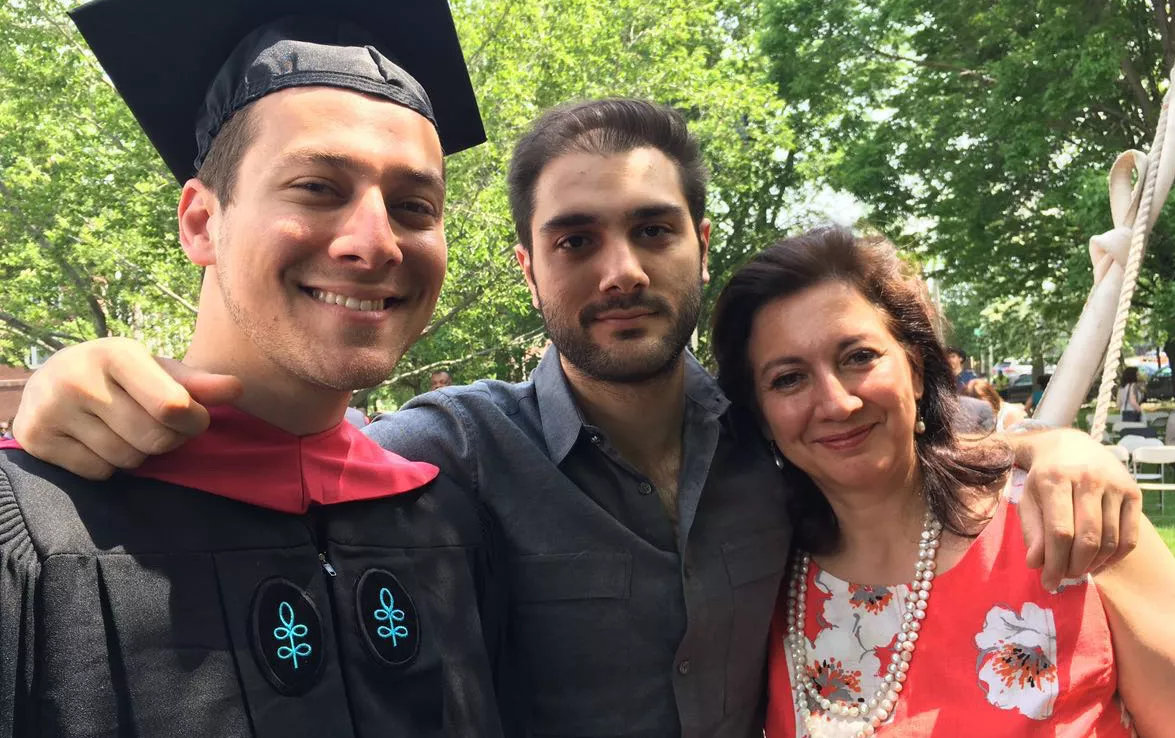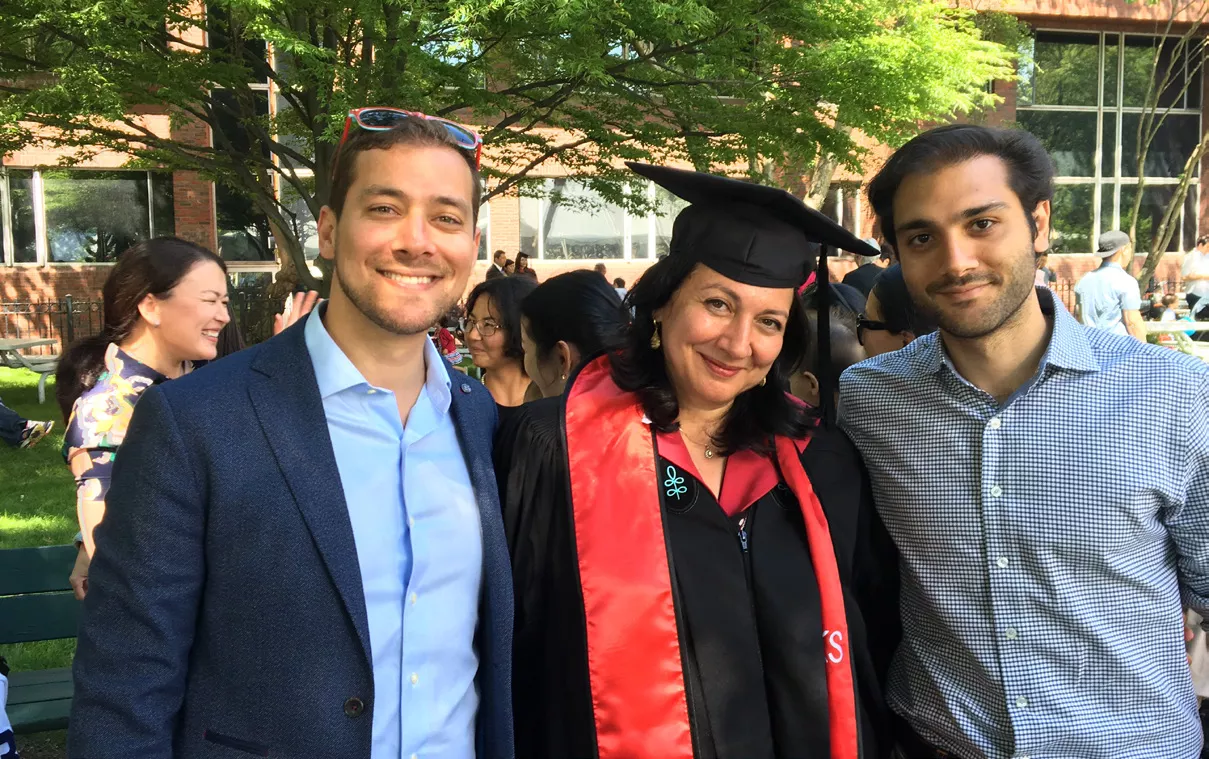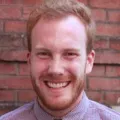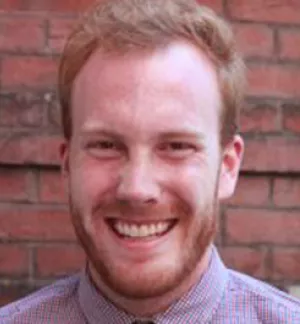For Khaled Kteily (MPP ’16), his mother’s encouragement to move towards a life of service led him from management consulting to the Kennedy School. And then his transformative HKS experience led his mother, Salma El-Yassir (MC/MPA ’18), to follow in her son’s footsteps. MEI sat down with Khaled and Salma to discuss how sharing classes, friends, and even the same apartment pushed their family to deepen their concepts of learning, leadership, and engagement with the region they call home.
“You know, it’s really freaky, but I have the same friends as my mom,” Salma El-Yassir quotes her son, Khaled Kteily, about their shared Kennedy School experience, an HKS legacy in reverse. “That’s the worst, by the way,” Khaled relates, “it went from ‘Salma, Khaled’s mom,’ to ‘Khaled, Salma’s son.’ We actually have mutual friends now. We’re on WhatsApp groups together. Not cool.” Reflecting more seriously, though, both enthusiastically admit that the whole experience has changed their relationship – and their notions of what education and leadership can be – for the better.

Driven to Serve, Better
“Going into consulting for me was always a strategic decision to develop the skills I needed for the long run,” says Khaled. But when he started considering an MBA, his mother started to worry, “that he was getting a little too sucked into the gold—” “—golden handcuffs,” Khaled knowingly finishes his mother’s sentence. But a lifelong passion for human rights and justice prompted a leave of absence to work for UN Women, which led him to seek out an MPP to solve a conundrum: “Consulting is very low on positive impact, very high in efficiency. And the UN is very high on impact, but very low on efficiency.”
This made his mother, who worked in NGOs serving refugees in Lebanon for years after her own transition from the private sector, “very pleased.” Her legacy and prodding, along with an Emirates Leadership Initiative fellowship, led Khaled to enroll at HKS in the fall of 2014, where he excelled. He became the first non-American elected President of the United States in Steve Jarding’s storied Making of a Politician course, and honed his negotiation, communications, and organizing skills with Brian Mandell, Jeffrey Seglin, and Marshall Ganz. But it was Ronald Heifetz that gave Khaled his biggest lesson.
Hemmed in by the infamous bidding system for popular classes, Khaled decided that Heifetz’s class was too good to pass up. So, “I just kept attending every class and doing all the assignments until, three months in, the class voted to let me stay. He would announce every week that I wasn’t supposed to be there. But of course, in a class all about authority and defying authority, I knew that he secretly loved it.” But he didn’t keep his learning to himself. He knew his mom was struggling with conundrums of her own leading NGOs working with refugees. “I was facing a lot of challenges in making changes,” Salma relates, “and Khaled told me about some of the courses he had taken that really helped him look at problems in new ways.”
Then, Salma attended an HKS admissions session in Beirut where Khaled was speaking. “Being his mom, I wanted to come and just cheer him on. Afterwards, I spoke with [then-Assistant Dean for Student Diversity and Inclusion] Alexandra Martinez about our scholarship program for refugee students and she turned to me and said, ‘Well, why don’t you apply?’ And I said, ‘I’m in my mid-fifties! Why would you want somebody like me?’ And she said, ‘You have an interesting background, and we look for diversity not only in background but in age and gender, etc.’ So she planted that seed.”
But Salma had just taken a new job, and Khaled didn’t feel the need for his mom’s company at school: “I told her she was not allowed to apply until after I graduated.” Eventually, though – “not on a whim, but in a fit of frustration,” reflecting on the need “for a different kind of leadership…in the NGO sector in our region” – she set aside eight days between Lebanon’s Independence Day (November 22) and December 1, 2016, and applied. When she received her acceptance on International Women’s Day, March 8, 2017 she took it as a sign and made the tough decision to tell her board she would be stepping down to pursue a mid-career MPA at HKS.
Shared Spaces
When Salma arrived in Cambridge, she inherited something else from her son: his apartment. Khaled started HKS just after his elder brother, Nour Kteily, now an Associate Professor at Northwestern’s Kellogg School of Management, wrapped up a postdoctoral fellowship at Harvard, where he had completed his PhD in Social Psychology. Naturally, Nour’s furniture became Khaled’s. After graduating in 2016, Khaled passed his furniture and apartment to fellow ELI Hamada Zahawi, who in 2017 handed it all back to Salma. But, perhaps unsurprisingly, Salma had grander plans for the space.
“My mom had something I call dinner diplomacy,” Khaled remarks, for which Salma added a table and six chairs and stocked up on cutlery, cookware, and Arabic spices. “During Heifetz’s January Term class, I would invite three people for dinner every day, and we had some really interesting conversations. One evening there was a Mormon, an LGBT activist, and a feminist around the same table.” Fostering conversation and community like this was not rare for either Salma or Khaled. Khaled founded the Harvard Arab Student Association (HASA) to confront disunity in the region, creating a space where, “we really learned to embrace everyone from every part of the region. We all focused on our shared love of hummus, falafel, knafeh, the bits and pieces everyone shared in common.” He also attributes this sense of unity to MEI programming: “I was going to sessions on Yemen, on Syria, on the UAE. It inspired me to take two classes on the Middle East…and it built a sense of community—that’s how I recruited for HASA.”
When Salma arrived on campus, fellow Arab students were both surprised and inspired to see someone from an older generation at HKS. She embraced this matriarchal role, and of course, used the power of food: “Two or three of us were kind of the moms in the group, cooking meals, iftars, whatever, and inviting the others. Whatever the differences were, we would gather around food.”

Bringing it Home & Paying it Forward
Creating community on campus reinforced a mutual, deep affinity for the Middle East and a desire to return and commit to serving the region. For Salma, “I feel a responsibility, both familial and cultural, to bring the kind of thinking I learned at HKS to organizations in the region.” Khaled agrees, “I think coming back is an inevitability. And I think there’s a heightened sense of responsibility for those of us who left and became skilled abroad. Like Ganz teaches [paraphrasing the old Rabbinic adage], ‘if not you, who? And if not now, when?’ That resonates a lot.”
That kind of thinking permeates the vision for leadership Salma and Khaled see running through the HKS curriculum. Classes as diverse as development and management with Ricardo Hausmann and Matt Andrews, democratic theory with Jane Mansbridge (Salma’s favorite), communications and organizing with Tim McCarthy, Seglin, Jarding, and Ganz, and adaptive leadership from Heifetz and Tim O’Brien, transformed the concept of leadership they grew up with: “Some guy – usually a guy – at the front, espousing a forceful vision and people coalescing around it,” to the notion that openly addressing blind spots and failures are integral to leadership, and that “vulnerability can make you a more effective and authentic leader.”
For Khaled, bringing this learning home translated into a role straddling private and public sectors with the World Economic Forum on stoking entrepreneurship in the Arab world. He is now pursuing a start-up of his own. Legacy—launched in 2018 at Harvard i-Labs—promotes male reproductive health and challenges the conventional wisdom that issues surrounding fertility apply only to women. Khaled soon hopes to expand to the Middle East, where smoking, air pollution, and conflict-related stress have taken a toll on male reproductive health (“A Male Infertility Crisis is Coming. The Middle East Can Help.” by Marcia C. Inhorn, Professor of Anthropology and International Affairs, Yale University, The New York Times Opinion section, Oct. 21, 2017.).
Salma is striking out on her own, too, crafting a practice around adaptive leadership tools learned from professors like Heifetz and O’Brien to help “deliberately developmental organizations” in the Middle East overcome immunity to change. “That’s how I think we in the region can grow, by creating real institutions. So that’s my new calling. That’s my third act.” And along the way, she is breaking another barrier that she overcame by attending HKS: tapping into the potential of women in her generation to lead third acts of their own.
Another essential part of spreading their vision is directing aspiring leaders from the region to the Kennedy School. They encourage students not to be intimidated by Harvard, emphasizing that, “there are so many exceptional students throughout the Arab world, currently underrepresented at HKS.” And they never hesitate to help anyone who is serious about applying, paying forward the support they received when they applied. Salma continues her work to increase scholarships and mentorship for students from the region, and to highlight the fellowship opportunities and programs at HKS, including MEI, that already exist. And most of all, they urge those students who do come to HKS to engage with MEI, to raise their voices on campus, to reclaim representation of a region so often misunderstood, and to fulfill their responsibility as the next generation of leaders.
“What Can Our Family Do?.” Mawhorter, Christopher, ed. Mosaic, December 20, 2019



